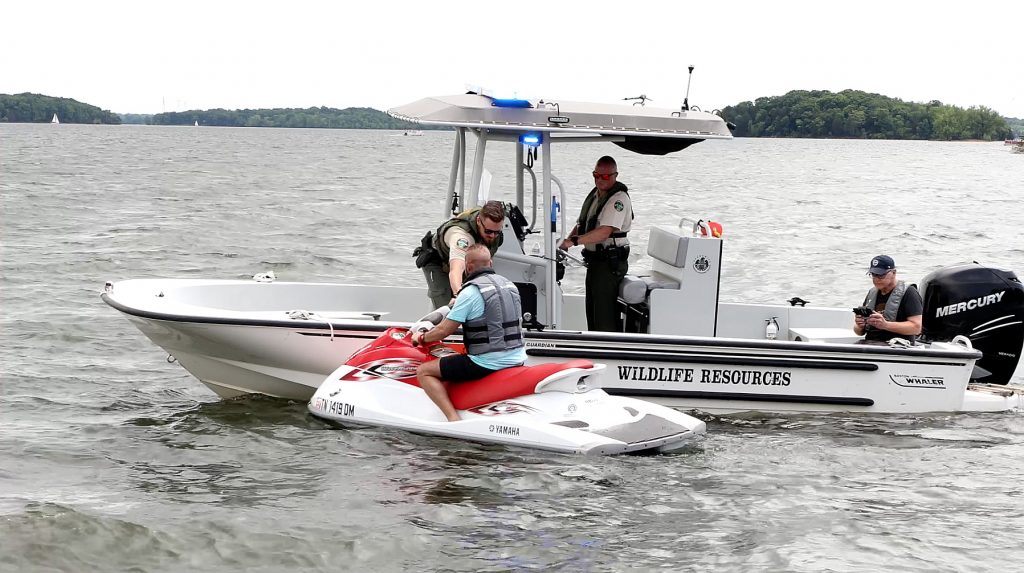Tennessee Boat Registration: Essential Steps and Guidelines
Tennessee is a popular destination for boating enthusiasts, with its numerous lakes, rivers, and reservoirs. Boating in the state requires compliance with the Tennessee Wildlife Resources Agency (TWRA) regulations, which include registering all motorized boats and meeting specific safety guidelines.

The process of registering a boat in Tennessee involves submitting the necessary paperwork and fees to the local county clerk's office. Boaters must also complete a boating safety education course, as mandated by the state law. Non-residents and owners of certain types of vessels are subject to additional regulations to ensure the safety and preservation of Tennessee's waters.
Key Takeaways
- Registering a boat in Tennessee is required for motorized vessels and involves submission of paperwork and fees.
- Boating safety education courses are necessary for compliance with state regulations.
- Tennessee implements additional regulations for non-residents and specific vessel types to promote conservation and safety.

Basics of Tennessee Boat Registration
Boating is a popular pastime in Tennessee, with countless lakes and rivers for boating enthusiasts to explore. In order to comply with state laws, boat owners must register their vessels with the Tennessee Wildlife Resources Agency (TWRA). Boat registration in Tennessee is crucial for any mechanically powered vessel or sailboat principally used in the state's waters.
The process of registering a boat in Tennessee begins with acquiring a Hull Identification Number (HIN), if the boat does not already have one. A HIN is a unique number that identifies the boat and allows for easy tracking of ownership and other details. It is essential to have the HIN available before attempting to register your boat.
Tennessee boat registration is not the same as titling, which is not required in the state. However, vessel registration establishes a formal record of ownership, serves as proof of the owner's right to use the watercraft, and helps ensure that the vessel meets all applicable safety and environmental standards. The requirements for boat registration vary slightly between counties, but they are generally consistent across the state.
Boat owners must provide proof of ownership, such as a bill of sale or other legal document, when registering their boats. Additionally, boat registration in Tennessee requires the payment of registration fees, which vary depending on the size and type of the vessel. Owners must also clearly display the Tennessee boat registration number (TN number) on the hull of the boat in accordance with TWRA regulations.

It is essential for new residents who own boats to register their watercraft with the state of Tennessee as soon as possible. The registration process can be completed at any local county clerks' office or online through the TWRA website. In some cases, new residents may also need to pay sales tax during the boat registration process.
By following the guidelines for Tennessee boat registration, boat owners can enjoy their time on the water with peace of mind knowing that they are in compliance with state regulations. Registering a vessel promotes boating safety and helps to protect the valuable natural resources of Tennessee's beautiful waterways.

How to Register a Boat in Tennessee
To register a mechanically powered vessel in Tennessee, follow these steps to ensure a smooth and successful process.
First, obtain a bill of sale from the dealer or previous owner. This document should include the hull identification number (HIN), the boat's make, model, and year, as well as the selling price. Also, ensure that the bill of sale specifies whether there is any warranty included.
Next, visit your local county clerk's office and obtain a boat registration form. Be prepared to provide your bill of sale as proof of sales tax payment if the boat has never been registered previously. More information on Tennessee boat registration form can be found here.
Temporary registration is available while you wait for your official documentation. This is particularly helpful if you have recently purchased a boat and need to register it immediately. Temporary registration can be obtained from the county clerk's office at the time of submitting your boat registration application.
Once you receive your registration card, keep it on board at all times while operating your boat. Renew your boat registration every two years in order to avoid any penalties.

Taking a boater safety course is highly recommended for all boat operators in Tennessee. A boating safety education certificate will be issued after completing this course and passing the exam. The Type 600 Boating Safety Exam Permit can be purchased online or from TWRA regional offices, and is required for taking the exam at a regional office.
There are certain exemptions from boat registration requirements in Tennessee. These include kayaks, rowboats, boats registered out-of-state operating in Tennessee for no more than 60 days, and vessels from another country temporarily using Tennessee waters. For more information on exemptions, call the Wildlife Resources Agency at (615) 781-6585.
In summary, registering a boat in Tennessee involves obtaining a bill of sale, submitting the necessary documentation to the county clerk's office, obtaining temporary registration if necessary, and completing a boater safety course for the best boating practices.

The Costs Involved
When registering a boat in Tennessee, there are several fees to consider. One of the primary expenses is the boat registration fee itself. According to the Tennessee Wildlife Resources Agency, the costs for boat registration vary based on the length of the vessel:
- Vessels 16' and under: $13 / $24 / $35 for 1 / 2 / 3 years respectively
- Vessels 16' to less than 20': $25 / $48 / $71 for 1 / 2 / 3 years respectively
- Vessels 26' to less than 40': $38 / $72 / $107 for 1 / 2 / 3 years respectively
Boats above 16 feet in length only offer annual registration options with the fees as follows:
- Vessels between 16ft and 26ft: $29
- Vessels between 26ft and 40ft: $44
- Vessels above 40ft: $59

Please note that these fees are statewide and do not vary by county.
In addition to registration fees, boaters also need to consider sales tax. When purchasing a boat, you must pay a sales tax depending on the state and local tax rates. The sales tax in Tennessee can range from 7% to 9.75% based on the county where the boat is purchased or will be used.
It is essential for boat owners to factor these costs into their budget before purchasing a vessel. Proper registration and tax compliance ensure that boat owners can navigate Tennessee waterways both legally and safely. Keep in mind that these costs may change over time, so it is prudent to check with the Tennessee Wildlife Resources Agency for the most up-to-date information about fees and regulations.

Boating Safety Education in Tennessee
Tennessee Wildlife Resources Agency (TWRA) is responsible for promoting boating safety education throughout the state. In order to ensure a safe and enjoyable boating experience for everyone, TWRA has established certain requirements and guidelines for boating education.
Any Tennessee resident born after January 1, 1989, is required to successfully complete the TWRA Boating Safety Exam. Upon completion, participants are issued a Boating Safety Education Certificate as proof of their knowledge on relevant laws and safety procedures. This certificate is essential for boat operation, as no other document is accepted as an equivalent to this requirement.
The boater safety course can be taken through various means to accommodate different preferences and schedules of the participants. There are instructor-led classes offered by TWRA at different locations throughout the state, all focused on providing comprehensive and up-to-date safety information. For those who prefer a flexible learning approach, there are also approved online boating safety courses available.

To take the TWRA Boating Safety Exam, participants must first obtain a Type 600 Boating Safety Exam Permit from a local TWRA license agent. The exam can be taken at any TWRA regional office or testing location, and participants are expected to complete the exam with a passing score of 70% or higher.
In summary, boating education plays a crucial role in ensuring a safe and enjoyable boating experience in Tennessee. The state's residents born after January 1, 1989, must obtain their Boating Safety Education Certificate through the TWRA Boating Safety Exam. With various course options available, obtaining this education and certification can be a seamless process for every participant.

Tennessee Wildlife Resources Agency (TWRA)
Role in Boating
The Tennessee Wildlife Resources Agency (TWRA) is responsible for the management and conservation of the state's fish and wildlife resources, including the oversight of boating activities. Their mission is to preserve, protect, and enhance the Volunteer State's diverse aquatic and terrestrial habitats, ensuring the sustainable use and enjoyment of these resources for current and future generations.
One of the key roles TWRA plays in boating is the registration of boats operating in Tennessee waters. They ensure that mechanically-powered vessels, as well as sailboats, comply with state regulations and maintain proper documentation.
TWRA also promotes boating safety through education and enforcement of boating laws and regulations. They work with the public to provide boating safety courses and disseminate essential information through their Boating Handbook.

Contact Information
Those seeking to engage with the Tennessee Wildlife Resources Agency can visit their official website for more information on fishing, hunting, and boating in the state. The site provides various resources, including information on hunting and fishing seasons, licenses, and boating education requirements.
Individuals looking to get in touch with the TWRA can visit their Contact Us page, which lists contact information for their regional offices and also provides a comprehensive directory of wildlife officers. This resource helps those in need to get in touch with the appropriate personnel for assistance with issues related to boating, fishing, hunting, and other outdoor activities.
For first-time boat registrations, renewals, and other related matters, the Go Outdoors Tennessee website serves as a convenient platform. This comprehensive online resource offers the necessary forms and procedures for registering boats, obtaining licenses, and taking part in other outdoor activities across the state.

Boat Registration Regulations for Non-Tennessee Residents
Non-Tennessee residents intending to operate a boat in the state should be aware of the applicable registration regulations. Generally, boats registered in other states are allowed to use Tennessee waters temporarily. However, some specific requirements apply to non-residents, especially in terms of boating education and safety certification.
Non-Tennessee residents born after January 1, 1989, must possess a boating education certification approved by the National Association of State Boating Law Administrators (NASBLA) if they wish to operate a boat with more than 8.5 horsepower while visiting the state1. This requirement ensures that boaters are knowledgeable and adhere to proper safety regulations.
In terms of boat registration, non-Tennessee residents can temporarily operate boats registered in other states within Tennessee waters for up to 60 days2. After this period, boaters must comply with Tennessee's registration requirements if they intend to continue using their boats in the state.
To summarize, non-Tennessee residents looking to boat within the state should ensure they have proper boating education certification if required and are aware of the temporary 60-day window for out-of-state registered boats. By complying with these regulations, non-residents can confidently and safely enjoy Tennessee's beautiful waterways.

Additional Regulations for Certain Types of Vessels
Sailboats
Sailboats in Tennessee are subject to specific regulations based on their size and capacity. Each person on board a sailboat or being towed must have a wearable device of the appropriate size readily accessible. This rule applies to rowboats, canoes, and rafts as well source. Sailboats that are propelled only by paddles or oars do not require registration in the state source.
Mechanically Powered Vessels
Mechanically powered vessels in Tennessee must have a required Certificate of Number and validation decals to legally operate on public waters. The Certificate of Number should be displayed on the vessel, and the validation decals must be placed on both sides of the boat's bow source. Additionally, various horsepower and engine type specifications must be adhered to, and these vessels must comply with safety procedures source.
Vessels with Electric Trolling Motors
Vessels with electric trolling motors are considered mechanically powered vessels in Tennessee and therefore require registration. The same registration requirements and safety guidelines apply to these vessels as other mechanically powered boats source.
Personal Watercraft
Personal watercraft, such as jet skis, in Tennessee are subject to additional safety procedures. These include the use of a wearable, Coast Guard-approved life jacket for each person on board, as well as the attachment of the engine cut-off switch lanyard, if equipped, to the operator. Personal watercraft operators must be at least 12 years old and should adhere to guidelines regarding age and operation source. Personal watercraft also require registration and validation decals in the same manner as other mechanically powered vessels source.

Tennessee's Approach to Conservation and Stewardship
Tennessee's government takes a determined approach to protect and manage its natural resources, focusing on conservation and stewardship. By implementing effective policies and strategies, the state ensures that Tennessee wildlife and habitats are preserved for future generations.
One of the key initiatives is the Land and Water Stewardship Section (LWSS), that works to reduce the impact of various land-use activities, such as development, farming, and mining, on water quality. This efforts helps maintain clean water resources, essential for both the wildlife and the residents of Tennessee.
The state places a strong emphasis on boating safety, as boating is a popular recreational activity in Tennessee. The Tennessee mandatory boating education law requires individuals to study and take an approved boating safety exam. This ensures that they are equipped with the necessary knowledge to safely navigate the state's waterways and minimize potential harm to the environment.
Additionally, the Conservation Stewardship Program, offered in collaboration with the Natural Resources Conservation Service, helps agricultural producers maintain and improve their existing conservation systems. By adopting additional conservation practices, they address priority resource concerns and contribute to the overall environmental health of the state.
To further protect its natural resources, Tennessee has implemented the Watershed Stewardship initiative, which focuses on the overall health and management of watersheds. This approach considers all activities within each watershed, organizing and guiding those activities to achieve clean water goals.
The continuous efforts by the state's government to preserve and manage its natural resources provide ample opportunities for residents and visitors alike to access Tennessee's beautiful landscapes and diverse wildlife, all while ensuring their long-term sustainability.

Understanding Tennessee's Hunting and Fishing Licenses
Tennessee offers a variety of hunting and fishing licenses to suit the needs of different individuals. These licenses are essential for anyone planning to engage in hunting or fishing activities within the state. Obtaining the appropriate license ensures compliance with Tennessee's laws and helps to conserve the state's wildlife.
Hunting and fishing licenses in Tennessee are valid from the date of purchase until 365 days after purchase for most license types. It is important to note that a Social Security Number is required by federal law to purchase a Tennessee hunting or fishing license. Licenses can be purchased online at the Go Outdoors Tennessee website or at authorized agents and vendors across the state.
There is a variety of license options tailored for both residents and non-residents of Tennessee. For instance, you can purchase an all-in-one Sportsman License, which covers most hunting and fishing activities. Alternatively, you can select specific packages such as the Reelfoot Angler Package for fishing at Reelfoot Lake, or the Small Game Hunter Package for hunting small game on private property across Tennessee.
For avid anglers and hunters, Tennessee offers Lifetime Licenses, which cover hunting, fishing, and trapping activities for the entirety of the license holder's life. These licenses are available for both children and adults, with prices varying based on the age of the applicant.

Boating in Tennessee requires a separate license, known as the Tennessee Boater Education Card. This card is mandatory for anyone born after January 1, 1989, who operates a motorized vessel on Tennessee waters. The Boater Education Card can be obtained by completing an approved boating safety course.
In addition to the various hunting and fishing licenses, certain permits may be needed depending on the specific activities and species targeted. For example, waterfowl hunting requires a Federal Migratory Bird Hunting and Conservation Stamp, also known as a Duck Stamp.
Remember to stay updated on the latest regulations concerning hunting and fishing activities in Tennessee. Seasons and license fees are subject to change, so it is critical to stay informed to ensure responsible and legal engagement with the state's wildlife and natural resources.

Registration Renewals
Renewing your boat registration in Tennessee is a crucial step for boat owners to ensure they can legally operate their watercraft. Boat registration renewals in the state can be done online, making the process more convenient and less time-consuming. To renew your boat registration online, you can visit the Tennessee Wildlife Resources Agency website.
Boat registration renewals in Tennessee can vary in duration. They offer the option to register your boat for 1 year, 2 years, or 3 years. The registration renewal fee will depend on the registration duration you choose. It's important to closely track your registration expiration date, as operating a boat with expired registration is illegal in the state.
In case there is a lien on your boat, the registration process might involve additional steps. Typically, the lienholder information must be included in the registration documents. When you pay off the lien, you might need to update your registration, removing the lienholder from the records. To be sure about the requirements in your specific case, contacting the Tennessee Wildlife Resources Agency is advisable.
By diligently keeping up with registration renewals and lien-related updates, boat owners in Tennessee can avoid potential fines or legal issues while enjoying their time on the water.

Closing Thoughts
Tennessee boating laws and regulations aim to provide a safe and enjoyable experience for all water enthusiasts. One crucial aspect of ensuring safety on the water is proper boat registration. In Tennessee, the Tennessee Wildlife Resources Agency manages the boat registration process. It is essential for boat owners to register their vessels and adhere to the required equipment guidelines.
When registering a boat, fees vary based on the length of the vessel. For instance, boats from 26 to 39 feet will have a registration fee of $38, while boats 40 feet or more in length will have a fee of $51. Boaters should be aware that Tennessee boating registration fees increased on July 1, with new fees set at $15, $28, and $41, depending on boat length.
Apart from registration requirements, boaters should also be familiar with the rules of navigating Tennessee waterways. For instance, boats must not come closer than 50 feet of a diver's-down flag and must operate at a slow, no-wake speed within 200 feet. Additionally, Alpha Flags signify that a vessel is engaged in diving operations or has restricted navigability, necessitating extra caution from nearby boaters.
By staying informed about Tennessee boating laws and correctly registering their vessels, boaters can continue to have safe and enjoyable experiences on the water.
Frequently Asked Questions
How do I renew my boat registration online?
To renew your boat registration online in Tennessee, visit the TN Wildlife Resources Agency website, and follow the instructions for online registration renewal. You will need to have your current registration information and a valid payment method available.
What is the process to register a boat without a title?
In Tennessee, if you purchased a boat from a private seller without a title, you will need to obtain a boat registration form from your local county clerk's office. Complete the form and provide proof of ownership, such as a bill of sale or signed statement from the seller confirming the transaction. Submit the completed form, required documents, and applicable fees to the county clerk's office.
What is the contact number for boat registration inquiries?
For boat registration inquiries in Tennessee, you may contact the Tennessee Wildlife Resources Agency at 1-800-648-8798 or 615-781-6585. They can assist you with any questions you have about boat registration, renewals, or transfers.
What are the requirements for boat registration numbers?
Tennessee boat registration numbers must be displayed on both sides of the bow of the vessel. They should be in block letters, at least 3 inches tall, and must contrast with the color of the boat. The registration number should be followed by a validation decal, which indicates the expiration date of the registration.
What is included in a proper boat bill of sale?
A proper boat bill of sale in Tennessee should include the following information:
- Buyer's and seller's names and contact information
- Description of the boat, including make, model, year, and hull identification number
- Purchase price and payment method
- Date of sale
- Signatures of both buyer and seller
The bill of sale serves as proof of ownership and should be kept for your records.
How do I transfer boat ownership in Tennessee?
To transfer boat ownership in Tennessee, the buyer must submit a completed boat registration form, along with the previous owner's title or a bill of sale as proof of ownership. If the boat is registered in another state, you may need to provide additional documentation. Submit the required documents and applicable fees to the county clerk's office to complete the transfer process.
Footnotes
- Boating Education In Tennessee - Tennessee State Government - TN.gov ↩
- Tennessee Boat Registration Instructions | DMV.ORG ↩
Charlie is Editor-in-Chief of Sea Magazine